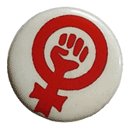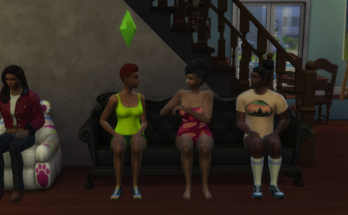By Giselle Fierro
For my ethnographic study, I interviewed Martha, a college sophomore of Chicago, on her thoughts and interests about Cosmopolitan (Cosmo) magazine/website in order to find out whether Cosmo is actually a feminist/non-racist space. She is an active reader of Cosmo. This ethnography was done by providing her with a set of questions that were answered through a skype interview. These questions were only used to guide conversation but were not the defining factor of discussion.
Martha sees Cosmo as a place where “teen women go for beauty and sexual advice,” as “a bible” that focuses on the best tips for fashion, male-attraction, and health. As Martha gave me a virtual tour of the Cosmo website, I had her verbalize the feelings and thoughts that went through her head naturally as she observed the content of the website. When she got to the “Fashion” section of the site, I began to notice a trend: many of her sentences changed from first person to third person point of view. It was no longer about the “I,” but rather about the “she” and “her.” The sentences went from, “Cosmo helps me pick out the good clothes on my next shopping trip [….] It helps me get ideas of what to wear and what looks good,” to “She really looks good in that top [….] but it wouldn’t look good on me because she has a great figure and I don’t have the body shape for it.” When we were looking at a particular shirt, she began to talk about how the shirt would not fit her well because “she didn’t have the right boob size to own that look.” Martha was no longer taking the site as an advice-giver, but rather as a place to compare herself relative to the women shown in Cosmo.
The “Diet and Health” section of Cosmo fused more insecurities to come out of Martha. As she toured me through this section, it was clear to me that Cosmo was not a place for her to “get advice from,” as she had said. Rather, it has become a place where she fantasizes on her desire to have the “perfect body and skin” that is shown in Cosmo. Her comments varied from, “Look at her perfect stomach,” to, “yeah, there’s no way I’ll ever be in shape like she is,” to, “my stomach looks so fat, I’m embarrassed.” When we entered the “Love and Sex” section, Martha’s comments revolved around her feelings of how “men aren’t attracted to her.” Although there were a few positive comments, such as, “I’m going to work hard to be in better shape,” most comments made were self-esteem crushers. Cosmo has unconsciously become a comparison game to her.
From interviewing Martha, one can see that Cosmo is catering the perfect bodily image to its readers. Martha is unconscious of how reading the content in Cosmo is affecting her personally and psychologically as she “learns” what bodily image perfection is in our society: white, heterosexual, slim women. At the end of the interview, I told Martha if she was aware of how reading Cosmo was affecting her emotionally and she responded, “I know. It’s hard not to get lost in the “what could be” and “what is” comparison. I don’t really notice it while I’m reading though [….] A lot on here (Cosmo) you read and you think it’s helping you but it’s really destroying you on the inside.” Clearly, Cosmo, a magazine that is supposed to cater to women of every type, is really advertising, as a commodity, the “right and desired” type of woman. The exclusion of “the others” creates an uncomfortable and degrading place for women who do not fit the image type that Cosmo caters to. Martha’s feeling of lack of agency over her body that Cosmo perpetuates on her clearly makes a statement that this site is not a feminist/non-racist space. It does not include the “safe space” that women look for in a feminist space.


Giselle,
Your ethnography is very well written. That must have been a difficult interview to do! I like that you were open with your friend and shared your findings, even if you knew they contradicted her self image as a Cosmopolitan reader. I stumbled on a documentary on mediaed.org called, Flirting with Danger, which addresses Cosmopolitan’s contribution to the oversexualization of our youth.
Keep up the good work!
Just in case you’re interested:
http://www.mediaed.org/cgi-bin/commerce.cgi?preadd=action&key=250
You highlight a very interesting point when you describes your friend as comparing herself to seemingly flawless women on the Cosmo website. I find that in my experience reading the magazine, I tend to unconsciously begin comparing myself as well. I think your research method is interesting; instead of just asking questions, you actually interacted with a person and had her take you through the site, which is very thorough, and based on your findings, very informative. I do understand where Martha is coming from; however I am interested to see maybe a few more peoples’ opinions regarding the site, maybe even one from a male, to broaden the research subjects to include more than just one individual (perhaps?).
Giselle,
I think that the answers you received from Martha are a perfect example of how Cosmo and basically any other mainstream women’s magazine can be a destructive force in women’s lives. While Cosmo is VERY sex positive, it frames its sex positivity and “empowerment” to women in a very heteronormative, hegemonic way. According to Cosmo, we should not crave sex for ourselves, but rather to please the men we’re with. I think that this ideology has spilled over onto the web site and forums available. Many women readers of Cosmo will overlook and ignore what’s right in front of them, opting to engage in what’s easy to digest: makeup, sex, and fashion.
It’s strange how reading Cosmo is like a masochistic act for this participant. It makes her feel insecure upon comparison with (Photoshopped) models who project literally unreal beauty standards, yet she considers herself an avid reader. Maybe the actual vocalization of her experience and feelings–a movement away from the cyber realm into the active body realm–forced her to confront the actuality of her experience in a different way. Maybe her insecurities came out because the cyber experience was being shared with another person…just a thought!
Wow, Giselle, this is really insightful. I really appreciate your method of using one person as sort of a case study to observe the affects that Cosmo’s content has on a personal level!
You definitely had an in-depth interview. I think the relationship between feminism and the (self)image of women is so hard to clarify and define. I think it would be great for you to refer to Chelsea’s ethnography as well.
The first thing that struck me about your ethnography was how you noticed the reader shifted from the first person to third person point of view when she began to discuss the fashion portion of the magazine. I see so many women who have developed this harmful ‘I’ (inferior) vs. ‘her'(superior) complex from engaging with magazines such as Cosmo and even from looking online at Facebook. It really upsets me how often I find people comparing themselves to others as if who they are themselves isn’t just as amazing. It is crushing to watch women ignore and even hate their own beauty as they constantly strive to reach a weird standard of beauty that is not necessarily even what beauty really is at all…if that makes sense. And what is crazy is how, despite their images reinforcing our societal standard of beauty as ‘white, heterosexual, slim women’, from my experience, many women that fit that description are still deeply insecure and self-conscious about their image because the standard they present is so ridiculous. Young women of all shapes, sizes, colors and cultures should have strong female role models to look up to as an alternative to these alienating images. However, while it is possible to stop reading cosmo, the unfortunate thing is how prevalent these confidence crushing images and ideas are inescapable. Looking at issues like these feels defeating because it is hard to imagine a feasible solution to the problem for our future generations!
The way you wrote your ethnography is really amazing. I love the way it flows and the way you sort of teased out all the ways in which she sort of gave herself away in her speaking about Cosmo. But I wonder how the website and the magazine can be separated so that we can find an understanding of how people use the website or the forums to create a space for themselves? Are they trolling? Are they genuine users? what are genuine users?
I really loved your findings especially how you picked up on something so implicit. it is great to see how the language she used to denote other concepts and themes. As a male, I do not look through these pages for body image reinforcement but for appreciation. And now I see that the appreciation of such an Anglo Saxon body further carries the stereotypes perpetuated. I find my sisters using these magazines and now I shall conjure up discussion as to how they feel when reading the magazine because I want to see if I get the same results. Amazing work and really interesting.
Your class mates’ comments say it all: well-written, subtle, and a great method to learn what you might not know on your own!